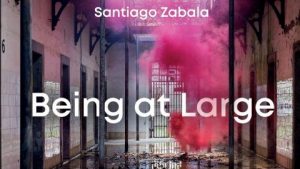Interview with Santiago Zabala, author of Being at Large: Freedom in the Age of Alternative Facts
Q: One of the central arguments of your book is that the “greatest emergency is the absence of emergency.” Could you please clarify this in relation to the ongoing pandemic caused by the coronavirus?
SZ: This thesis does not mean that a crisis such as the coronavirus is not a fundamental emergency that we must confront at all levels. It simply suggests the greatest emergency are the ones we do not confront. These include, among others, economic inequality, refugee crises, and climate change. Despite the warnings of scientists and activists since the 1970s, climate change is responsible for the death of seven million human beings every year because of air pollution. We can only hope climate change might also become an “emergency,” fought with the same unified purpose by many people as is now. What is dramatic about COVID-19 is that it was an “absent emergency” until very recently; just one year ago the WHO director-general, Dr. Tedros Adhanom Ghebreyesus, warned us that the “threat of pandemic influenza is ever-present.” Unfortunately we did not listen and now we find ourselves facing an existential threat.
Q: In chapter 8 you describe biodiversity loss as one of our greatest emergencies. Now that the destruction of nature is increasingly seen as key driver of zoonotic diseases, you seem to have anticipated the origin of this pandemic.
I wouldn’t go that far. But biodiversity loss, together with right-wing extremist populism and the treatment of whistleblowers, is one of the three greatest emergency I examine in the book. The fact that we are now in this pandemic ought to invite us to think how to prevent the emergencies we ignore from becoming emergencies we have to confront immediately.
Q: How can we prevent this from happening in an age of alternative facts, fake news, and post-truth?
We must first remind everyone that warnings alone, like facts or data, do not stand up all by themselves. These need government agencies, major newspapers, and credentialed academics to convince of their meaning. This is the central problem of this age of alternative facts. The internet, and social media in particular, have tricked us into believing that traditional vectors of authority and legitimation are not needed anymore to know facts. Fake news is the result of information unattached to interpretation, that is, filters, monitors, and guidelines. Facts and truth need all the help they can get to capture our attention and hopefully, reaction. This is what philosophical hermeneutics is all about. When we ignore warnings from scientists or organizations such as the WHO on pandemics, as Trump and Bolsonaro do, we are the interpretations that can reveal an emergency and bring it forth out of absence.
Q: In the book you also claim that political theories of the “state of exception” aren’t enough to understand our emergencies anymore. Why?
SZ: Yes, that’s right, we need to overcome the idea that it is the “sovereign who decides on the exceptional case.” The difference between the presidencies of George W. Bush and Donald Trump illustrates why. Trump will not be remembered for exercising extralegal powers to transform the “state of emergency” into routine political measures, as Bush did, but rather for denying pressing emergencies altogether. He no longer needs to take advantage of pretexts to establish states of exception because the exception—in the form of unprecedented technological, social, and political global framings—has already become the rule.
Q: Trump was also among the first politicians to attack those traditional vectors of authority and legitimation you mention above.
Yes, any disregard for facts that contradict agendas is a symptom of a global call to order and return to “realism,” which Trump and other populist politicians and academics mobilize as the defining political stance of current times.
Q: Who are these intellectuals calling for a global return to order whom you refer to?
Those who oppose the contributions of postmodern thinkers to politics and culture. These include the psychologist Jordan Peterson, the philosopher Christina Hoff Sommers, and other adherents of the “intellectual dark web” and the “new realism” movement. The problem with postmodern stances, they claim, is that they have denied thought any rational access to things in themselves, legitimizing an epidemic of “political correctness” that must be reversed in favor, among other things, of the certitude of “biological differences between men and women.” This is why Sommers, for example, opposes those feminists who still “believe that our society is best described as a patriarchy, a ‘male hegemony,’ a ‘sex/gender system,’” and instead promotes “factual feminism,” which grounds the basic tenets of feminism in a data-driven approach. In sum, the need for realism is, ultimately, an effect of neurotic ressentiment. It refuses to recognize itself as part of a game of interpretation, filters, and frames. This resentment is manifest among right-wing populists, the “intellectual dark web” community, and the new realist philosophers alike. Slavoj Žižek recently reminded them that “postmodern relativism” is not the cause of alternative facts. These have always existed. “Facts or data,” he continues, “are a vast and impenetrable domain, and we always approach them from (what hermeneutics calls) a certain horizon of understanding, privileging some data and omitting others.”
Q: What is the task of philosophy in this global framed condition you describe?
For too long we have been “rescued from emergencies,” told that we are saved by temporary fixes that ignore the greatest emergency, when in fact we ought to be “rescued into emergencies.” Now is the time to disrupt the ongoing “return to order” that surveillance capitalism and right-wing populism are imposing upon us. Philosophy, art, and the humanities in general must take on this task as science is too framed by economic and technological interests these days.
Q: Why are the TV series Mr. Robot and works from the series Silent/Shapes by Italian the artist Filippo Minelli on the cover good examples to keep in mind while reading the book, as you suggest in the introduction?
I think they embrace the significance of the book’s central concepts and how it is crucial to be at large, that is, free, in this age of alternative facts. The main character of the TV series, Elliot Alderson, is a cybersecurity engineer and hacker who attempts, among other things, to bring down a megacorporation that frames our freedom, and Minelli’s photographic smoke bombs are attempts to disengage from something we’ve become framed within. This particular smoke bomb used on the cover was deployed in in an abandoned prison called the Presidio de Trafaria, near Lisbon. Elliot’s hacks, like these smoke bombs, can only take place as fugitive events that strive to disappear even as their effects ripple out in both art and the real world. When we are at large freedom becomes itself; it comes to the fore independently of any foreign imposition, such as Elliot’s hacks or Minelli’s smoke bombs. But for freedom to advance within our global framed order we must take an existential stance, that is, lend meaning through interpretation to those emergencies that I mention above.
Q: How would you suggest the reader approach your book? Can each part—on existence, interpretation, and emergency—be read separately?
Yes, each part can be read separately, but I would recommend reading the introduction first. Also, it can be helpful to keep in mind of each part’s secret guiding question: “What remains of existence after metaphysics?” “What is the anarchic vein of interpretation?” and “Why is the greatest emergency the absence of emergency?” The answers will reveal the meaning of freedom in this age of alternative facts.
*The Interview above was originally posted here.
